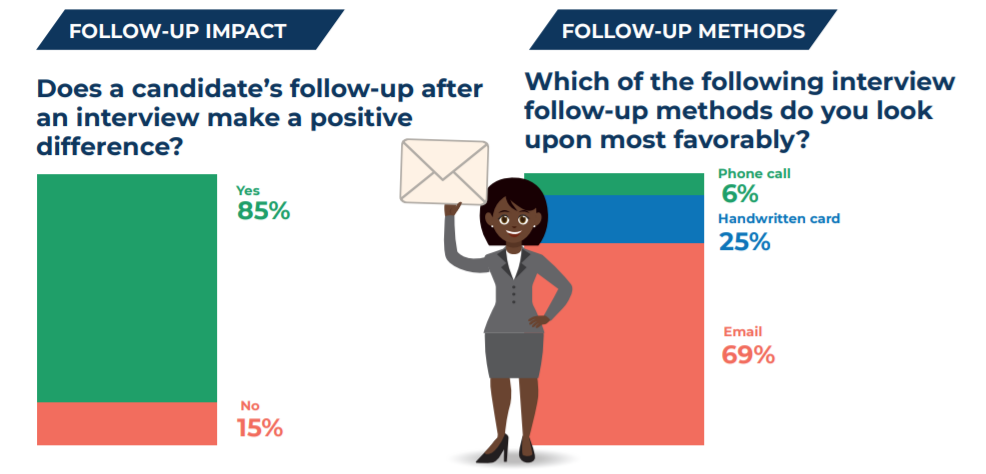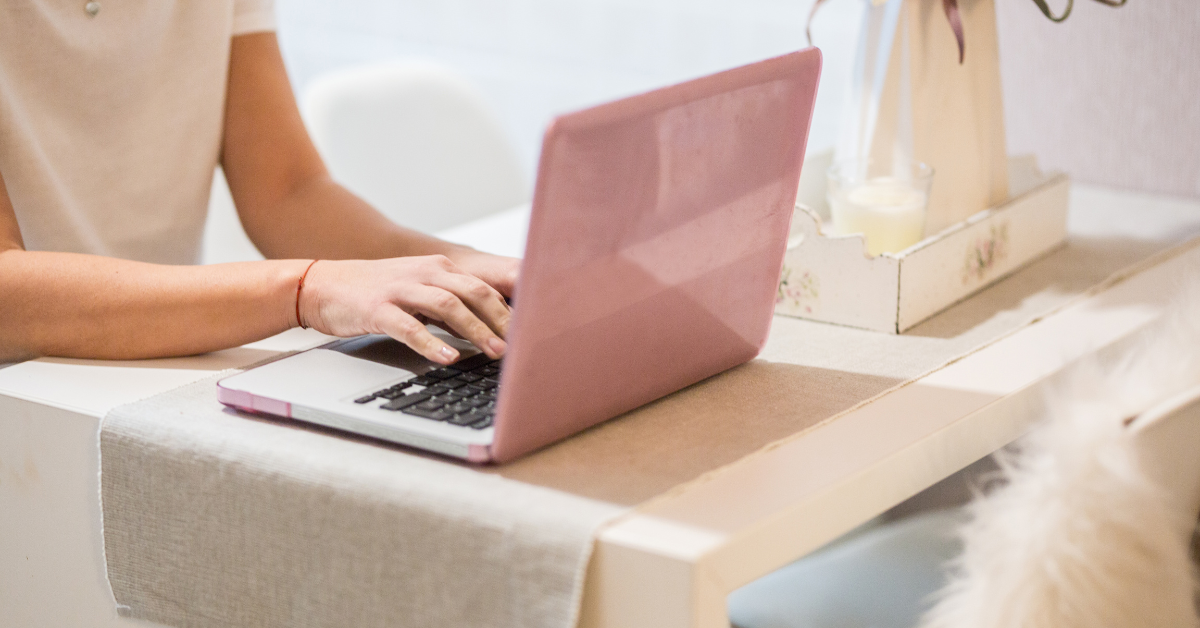Most job candidates (57%) don’t send thank-you notes after an interview.
Here’s why that’s good news for you.
According to a recent Murray Resources survey, 85% of hiring managers, executives and HR professionals say that a candidate’s follow-up after an interview makes a positive difference.
Another study found that 1 in 5 recruiters and hiring managers will automatically dismiss a candidate if they haven’t sent an interview thank you email.
The upshot? Sending a thank you note can differentiate your candidacy in a crowded job market – and help you land the job.
But how should you follow-up? Is a handwritten card best or are emails or phone calls preferred?
Email is the clear winner.
According to the Murray Resources survey, 69% of hiring managers prefer receiving an email, a distant favorite over handwritten cards (25%) and phone calls (6%).

Here are our best tips on how to write a thank you email after an interview.
1. Write a clear subject line.
Write a subject line that simply and clearly lets the interviewer know what the email is about.
Include words such as “Thank you” or “Follow-up” and the interviewer’s name. Here are a few ideas:
- “Thank you, Jeff.”
- “Thank you for the interview!
- “Following-up after our interview”
- “Thank you for your time, Amy!”
Also consider including the position name within the subject line to immediately provide context.
For example, you could say, “Follow-up regarding Junior Sales Rep position.” Just keep the subject line short and sweet. It’s recommended to not go over 9 words or 60 characters.
2. Personalize your email.
If you Google “thank you email templates,” you’ll find hundreds of examples. But don’t simply copy/paste a template.
Instead, personalize the email.
Here are five steps for personalizing and writing your email:
1. Provide an appropriate greeting. Include the interviewer’s name in the email. In a business email, it’s appropriate to use “Dear” followed by the interviewer’s first name and a comma (you can use a colon for increased formality).
2. Thank the interviewer. Quickly and sincerely express how much you appreciated the interviewer’s time. This can be as simple as “Thank you again for meeting with me today.”
3. Reiterate that you’re interested. Summarize why you’re a good fit for the position and share something about the position or the company that stood out during the interview. You could also share ideas for solving a particular problem or results you’ve had in the past.
4. Build rapport. Consider referencing something personal you talked about in your interview such as a sports team, hometown, or your shared love of dogs.
5. Close the email. Let the interviewer know that you’re available for questions and that you look forward to next steps. Close with a professional sign-off such as “Best regards.”
Analyze your audience before writing your email so that you can hit the right tone. For example, was the interviewer more formal during your interview? Use a formal, polished tone in your email. Try to match the tone of the interviewer and the culture of the company.
Read More: 3 Interview Thank You Email Templates You Can Customize
3. Edit, edit, edit.
It’s important to send your email quickly so your candidacy is fresh on the interviewer’s mind. However, you have to balance speed with quality.
According to the Murray Resources survey, 87% of hiring managers, executives, and HR professionals report that poorly written or unprofessional communication removed a candidate from consideration.
Carefully proofread your email to ensure that there are no mistakes.
Run your email through a free writing service like Grammarly. This tool can help you spot typos and grammar issues.
In addition, read your email out loud before sending. This practice often helps us catch errors and clunky sentences. You can also use a free tool like Hemingway to create short, effective copy.
4. Adapt for multiple interviewers.
58% of hiring managers reported conducting three or more rounds of interviews per role, so it’s likely you’ll interview with more than one person.
While you should send a thank you email to each interviewer, you don’t have to completely rewrite each email. However, they should be adapted. Try to reference something you individually discussed.
If you only have one email address, thank the group. Here’s a great resource on how to properly greet multiple people via email.
5. Send your email within 24 hours.
Timing is crucial at this point of the interview stage. Show that you’re truly interested in the position by following up with a thank you email within 24 hours.
A well-crafted, timely email following a successful job interview could be the tipping point that catapults you to the top of the finalist pool.
Go the extra mile with a well-written thank you email.
Stand out from the crowd. Write a carefully-worded thank you email that helps you get that next interview (and hopefully the job!).
If you need interview prep or career coaching, check out our top-rated services at ResumeSpice. Contact us at 832-930-7378. We’d love to work with you!






